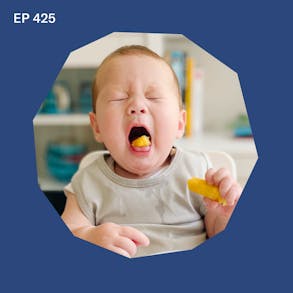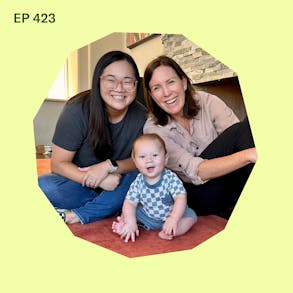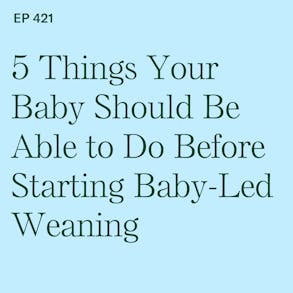What Do I Do if My Baby Has an Allergic Reaction? with Ron Sunog, MD
- Which foods babies are most likely to have allergic reactions to...and what we should be on the lookout for to identify a potential allergic reaction to a new food
- Why some food reactions go away on their own but why others may require intervention, including Benadryl...and how to know your baby's Benadryl dose (it involves talking to your pediatrician, not reading the medicine bottle!)
- What constitutes high risk for babies and what parents who have food allergies themselves or babies who are at high risk for food allergies should do regarding introduction of potentially allergenic foods
LISTEN TO THIS EPISODE
SHOW NOTES
What should you do if your baby has an allergic reaction to a new food? In this interview I’m joined by pediatrician and food allergy specialist Ron Sunog, MD who knows exactly what to do (...and also shares some tips on what NOT to do!).
You don’t need to park your car outside of the Emergency Department to trial new foods with your baby in the event of a reaction. Dr. Sunog is walking us through the more logical precautionary steps to take as we introduce our babies to potentially allergenic foods, and then what to do in the (rare) event that your baby does have a reaction.
Dr. Sunog is the author of the book EAT THE EIGHT: Preventing Food Allergy with Food and the Imperfect Art of Medicine. And in this interview he’s dishing on Epi-Pens, Benadryl and talking us through which babies are at higher risk for food allergies and how those families (plus lower risk ones too) can and should be prepared for allergic reactions when starting new foods.
SUMMARY of episode
In this episode, I’m joined by Ron Sunog, MD a pediatrician and author specializing in food allergies. Dr. Sunog is sharing:
Which foods babies are most likely to have allergic reactions to...and what we should be on the lookout for to identify a potential allergic reaction to a new food
Why some food reactions go away on their own but why others may require intervention, including Benadryl...and how to know your baby’s Benadryl dose (it involves talking to your pediatrician, not reading the medicine bottle!)
What constitutes high risk for babies and what parents who have food allergies themselves or babies who are at high risk for food allergies should do regarding introduction of potentially allergenic foods
LINKS from episode
Previous podcast interview with Dr. Sunog:
To learn more about Ron Sunog, MD:
BOOK: “EAT THE EIGHT: Preventing Food Medicine with Food and the Imperfect Art of Medicine” (this is an affiliate link).
VISIT website: “EAT THE EIGHT” campaign to safely offer babies all 8 allergenic foods early and often.
CHECK OUT: Puffworks Baby Peanut Butter Puffs for safe introduction of peanut protein for babies age 6 months+ use code BABYLED for 10% off (this is my affiliate code)
TRANSCRIPT of episode
WANT MORE BLW INFO?!
SUBSCRIBE to the Baby-Led Weaning Made Easy Podcast here - new episodes are released on Monday and Thursday and subscribing means you’ll never miss what’s new (+ you’ll get notified about special bonus episodes too!)
FOLLOW Katie’s baby-led weaning Instagram page @babyledweanteam for daily video trainings - lots of great info on introducing potentially allergenic foods for babies here too.
SIGN UP for Katie’s free online workshop “BABY-LED WEANING FOR BEGINNERS: How to get your baby to try 100 foods before turning 1 without you having to spoon-feed purees or buy pouches” - everyone on the free workshop gets a copy of the 100 FIRST FOODS LIST including the BIG 8 allergenic foods + sesame so you can try them early and often with your baby too!

Latest Episodes






Get baby-led weaning recipes and tips delivered right to your email inbox.